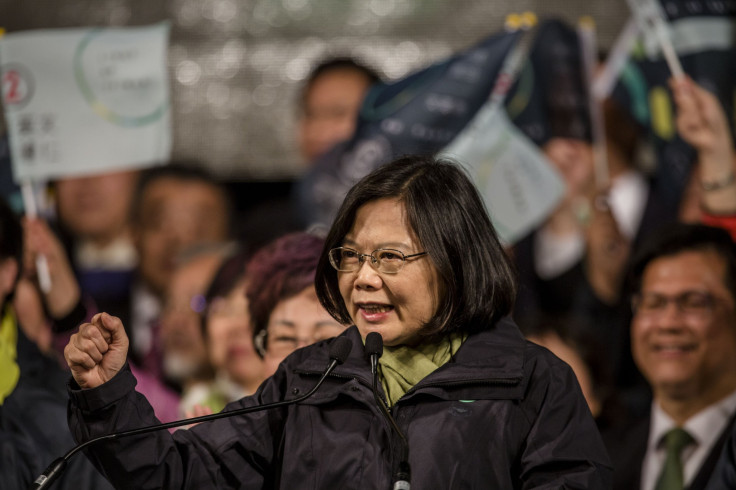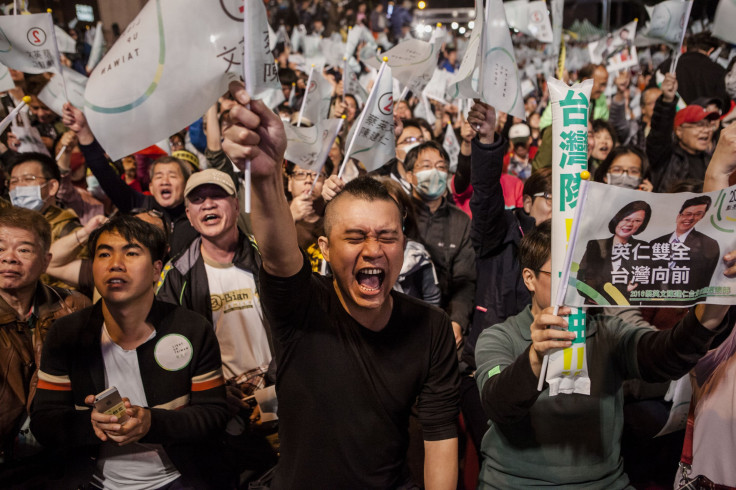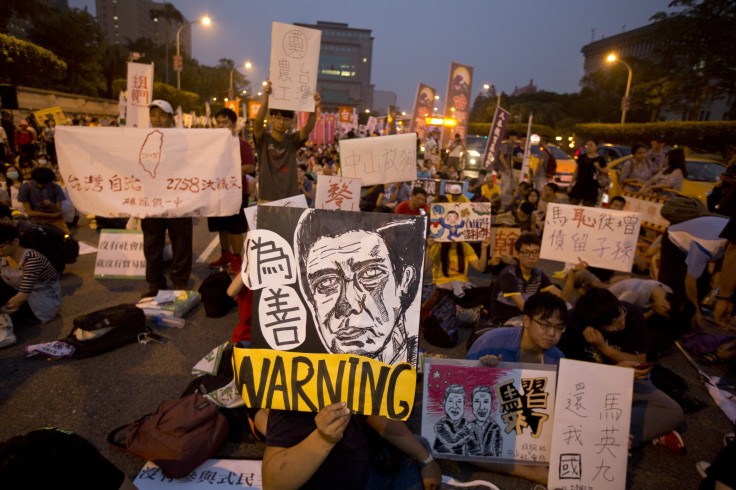Sweeping Opposition Victory In Taiwan’s Election Sends Strong Message To Beijing About Island’s Separate Identity

SHANGHAI — Opposition politician Tsai Ing-wen won a sweeping victory in Taiwan’s presidential election Saturday, as voters sent a clear message to China’s leaders that the island of 23 million, which Beijing claims as part of its territory, is determined to chart its own political course. Tsai, who becomes the island’s first female leader, overturned eight years of rule by the nationalist Kuomintang (KMT) party — which has sought closer ties with Beijing — and pledged to defend Taiwan’s sovereignty and separate identity.
The 59-year-old former legal scholar won a resounding 56 percent of the vote — a slap in the face for Beijing, which regards Tsai and her Democratic Progressive Party (DPP) as having pro-independence tendencies. The DPP has been held the presidency before (2004-08) but never with such a sweeping mandate. It also seized control of the island’s Legislature for the first time.
The result is being seen as a rejection of the policies of outgoing President Ma Ying-jeou, who opened up Taiwan to Chinese investment, tourism and direct transport links for the first time since the two sides fought a civil war in 1949. Ma’s policies are widely seen to have benefited big business far more than ordinary citizens, and he has been blamed for slowing economic growth.
Tsai has pledged not to declare independence, and promised in her victory speech to “maintain the status quo for peace and stability across the Taiwan Strait” and “ensure that no provocation or accidents take place.” But she also stressed Tawan's “democratic system, national identity and international space must be respected,” adding any attempt to “suppress” these would “harm the stability of cross-Strait relations” — an apparent reference to China’s policy of preventing Taiwan from joining international organizations.

In a further sign she would be more assertive in setting out distinct policies, Tsai called for freedom of navigation in the disputed South China Sea and for a peaceful resolution of tension in the area. Beijing has recently built several artificial islands in waters also claimed by a number of southeast Asian nations, and has warned others not to infringe on what it says is its sovereignty in the region. Under Ma, Taiwan had expressed sympathy for China’s position — and Chinese academics have warned a change in policy could lead to heightened tensions. Another move that could worry Beijing is Tsai's pledged to “continue to strengthen” ties with Japan, a nation China sees as a potential rival and with which it has disputes over islands in the East China sea.
Beijing responded to Tsai’s victory by saying its “policy toward Taiwan will not be changed by its election results” and stressing it will continue to “oppose Taiwan independence.” It called on the people of Taiwan to cherish the "hard-won good momentum" of recent years.
The U.S., which has only informal ties with Taiwan at China’s insistence, issued a statement praising the democratic election, but appearing to call for calm in the region. State Department spokesman John Kirby said in the statement the Unites States shares “with the Taiwan people a profound interest in the continuation of cross-Strait peace and stability.”
Wu Jieh-min, a scholar at Taiwan’s Academia Sinica, told International Business Times he believes Tsai “would be practical and cautious. … I’m positive that there will be no imminent crisis, for tourism, trade or investment between the two sides.”
But analysts say Tsai could face pressure from more radical members of her party, and her comments, like the election result, will be a reminder to Beijing that a sense of identity in Taiwan has only grown stronger in recent years amid China’s attempts to influence the island's people through closer economic ties, which have brought millions of Chinese tourists and thousands of students to Taiwan.
Also elected to the Legislature were several young politicians with links to the Sunflower Movement, a student-led group that occupied Taiwan’s Legislature for three weeks in 2014 to protest what were seen as secret deals between Ma and China’s leaders. One of those elected Saturday was New Power Party candidate Freddy Lim, death metal singer and former head of Amnesty International in Taiwan, who reportedly proclaimed excitedly, “I am the first rocker elected to become a legislator.”
Resistance to Chinese pressure was highlighted in the runup to the election by the case of Taiwanese singer Chou Tzu-yu, 16, who was criticized in the mainland after appearing on television holding Taiwan’s flag, which Beijing does not recognize. Chou Friday issued an apology for the incident online, infuriating many in Taiwan who saw this as the result of Chinese pressure. Some said the incident helped boost support for Tsai and the DPP.
“It made people very angry. A lot of people have been talking about it over the past day,” Chen Yi-chien, head of the feminist Awakening Foundation, told IBT on polling day.
Chen said Tsai’s election showed Taiwan was becoming a “more mature society” after many decades of control by the traditionally male-dominated KMT. She said it was “not the end” of efforts to seek a higher status for women in Taiwan, but it was “a good start.”
However, like many, including some who voted for Tsai, Chen expressed reservations about the incoming president’s ability to fulfill the desire of voters for more redistributive economic policies, including a higher minimum wage and pensions, and reforms of the taxation system.
Analysts say Tsai’s sweeping victory and promise of “more accountable" government will also raise popular expectations, which could be difficult to meet — particularly at a time of economic slowdown — for a politician who some see as relatively conservative in her economic and social policy.
To Beijing, though, Tsai will undoubtedly appear a more radical and unpredictable leader than the outgoing Ma, who held talks with mainland President Xi Jinping in Singapore in November, the first meeting between the leaders of the two sides since 1949.

But Jean-Pierre Cabestan, a specialist in Taiwan’s politics at Hong Kong’s Baptist University, said while China might issue veiled threats to Tsai, urging caution, it ultimately "still wants to keep Taiwan doing business with China.” Cross-straits trade is worth some $200 billion annually, and Cabestan said while China might potentially downgrade ongoing informal talks between bodies representing the two sides, it was unlikely to take drastic action unless Tsai threatened to declare formal independence, which no one expects her to do.
Nevertheless, Beijing is likely to watch developments on the island more closely than ever in the coming years.
© Copyright IBTimes 2024. All rights reserved.






















